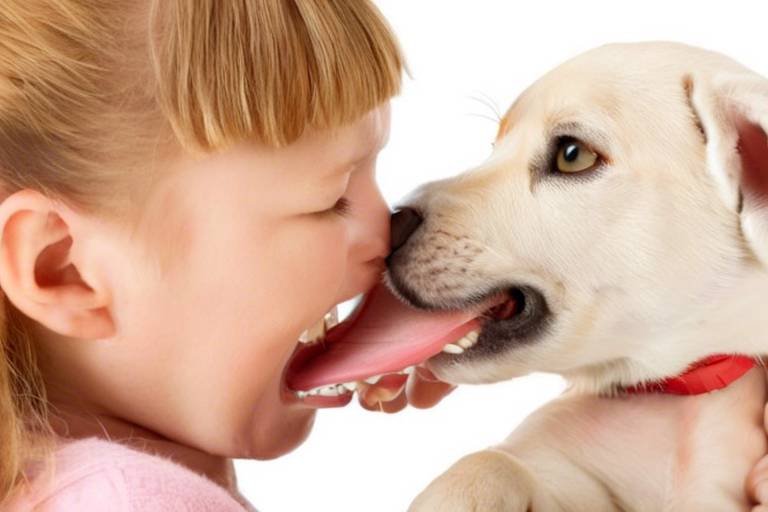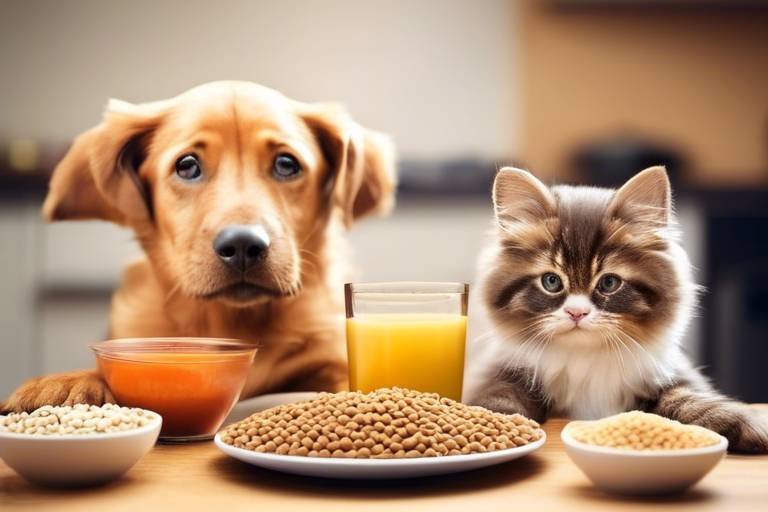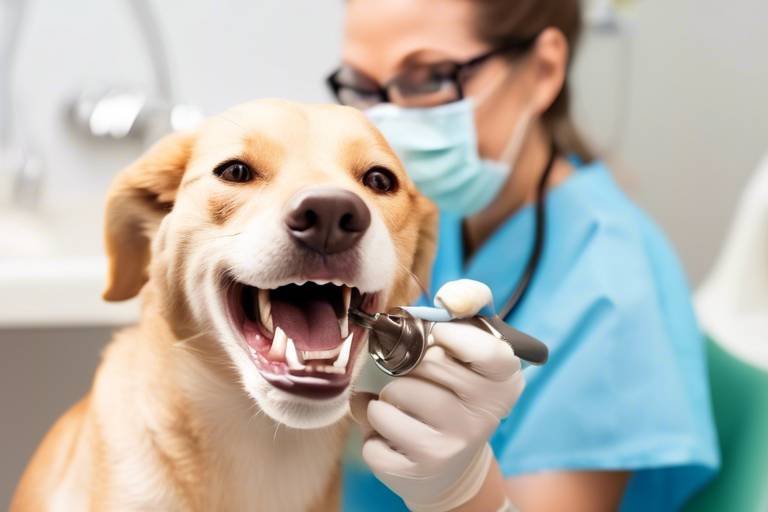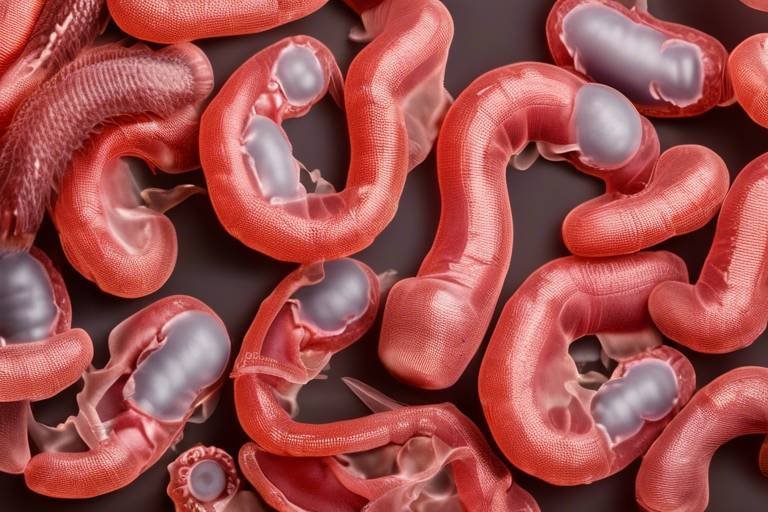The Role of Nutrition in Pet Behavior
Have you ever noticed how your furry friend's mood can change after a meal? It's not just your imagination! Nutrition plays a pivotal role in shaping the behavior of our beloved pets. Just like humans, pets require a balanced diet to thrive, and the right nutrients can significantly influence their temperament and overall well-being. In this article, we will delve into the fascinating relationship between what your pet eats and how they behave, offering insights and practical tips to help you enhance your pet’s life through better nutrition.
When we think about pet care, we often focus on physical health—ensuring our pets are free from illness and maintaining a healthy weight. However, behavioral health is equally important. A well-balanced diet can lead to a happier, more stable pet, while poor nutrition may result in anxiety, aggression, or lethargy. So, how exactly does what’s in your pet's bowl affect their mood and actions? Let’s explore this connection further.
At the core of pet nutrition are essential nutrients, including proteins, fats, carbohydrates, vitamins, and minerals. Each of these elements plays a crucial role in maintaining not only physical health but also behavioral health. For instance, proteins are vital for growth and repair, while fats provide energy and support brain health. Carbohydrates, on the other hand, are essential for sustained energy levels. The right balance of these nutrients can help your pet feel more energetic and less anxious, leading to improved behavior.
Many pet owners might be surprised to learn that certain dietary choices can lead to noticeable changes in behavior. For example, pets that consume high-quality food rich in omega-3 fatty acids often exhibit calmer behaviors and reduced aggression. In contrast, diets lacking in essential nutrients may contribute to behavioral issues such as hyperactivity or anxiety. Understanding these connections is vital for any pet owner who wants to provide the best for their furry companions.
As we proceed, we will also identify common nutritional deficiencies that can negatively impact pet behavior. Recognizing these signs early can help you make the necessary adjustments in your pet's diet to promote a happier and healthier life. So, let’s embark on this journey to discover how to optimize your pet's nutrition for better behavior!

Understanding Pet Nutrition
When it comes to our furry companions, nutrition is more than just a matter of filling their bowls with food. It’s about providing a balanced diet that supports their overall health and influences their behavior. Just like humans, pets require a variety of essential nutrients to thrive, and understanding what these nutrients are can help us make informed choices for our pets’ diets. So, what exactly should we be looking for?
First off, let’s break down the key components of a pet's diet. Pets need a combination of proteins, fats, carbohydrates, vitamins, and minerals. Each of these elements plays a unique role in maintaining not just physical health, but also emotional well-being. For instance, proteins are crucial for building and repairing tissues, while fats provide energy and help absorb certain vitamins. Carbohydrates serve as a quick energy source, but they also support digestive health. Vitamins and minerals are vital for various bodily functions, including immune response and energy production.
Let’s take a closer look at each nutrient:
| Nutrient | Function | Sources |
|---|---|---|
| Proteins | Builds and repairs tissues | Meat, fish, eggs |
| Fats | Provides energy and supports cell function | Fish oil, chicken fat |
| Carbohydrates | Quick energy source and aids digestion | Grains, vegetables |
| Vitamins | Supports immune function and overall health | Fruits, vegetables, fortified foods |
| Minerals | Essential for bone health and metabolic processes | Meat, dairy, leafy greens |
As you can see, a well-rounded diet is essential for keeping your pet happy and healthy. But what happens when they don’t get the right balance of these nutrients? Well, just like a poorly tuned engine, a pet's body can start to misfire. Imbalances can lead to a host of behavioral issues, from anxiety to aggression. Imagine if you were constantly hungry or felt sluggish; you’d probably be a bit cranky too!
Moreover, the quality of the food matters just as much as the quantity. Low-quality pet foods often lack essential nutrients and can be filled with fillers that do little to support your pet's health. Reading labels is crucial. Look for foods that list real meat as the first ingredient and avoid those with vague terms like “meat by-products.” A high-quality diet not only provides the necessary nutrients but also helps in promoting a stable mood and good behavior.
In summary, understanding pet nutrition is about more than just feeding your pet; it’s a commitment to their overall well-being. By providing a balanced diet rich in essential nutrients, you can help your pet lead a healthy, happy life. Remember, a well-fed pet is a happy pet, and a happy pet is less likely to exhibit behavioral issues. So, let’s dive deeper into how diet specifically influences behavior!
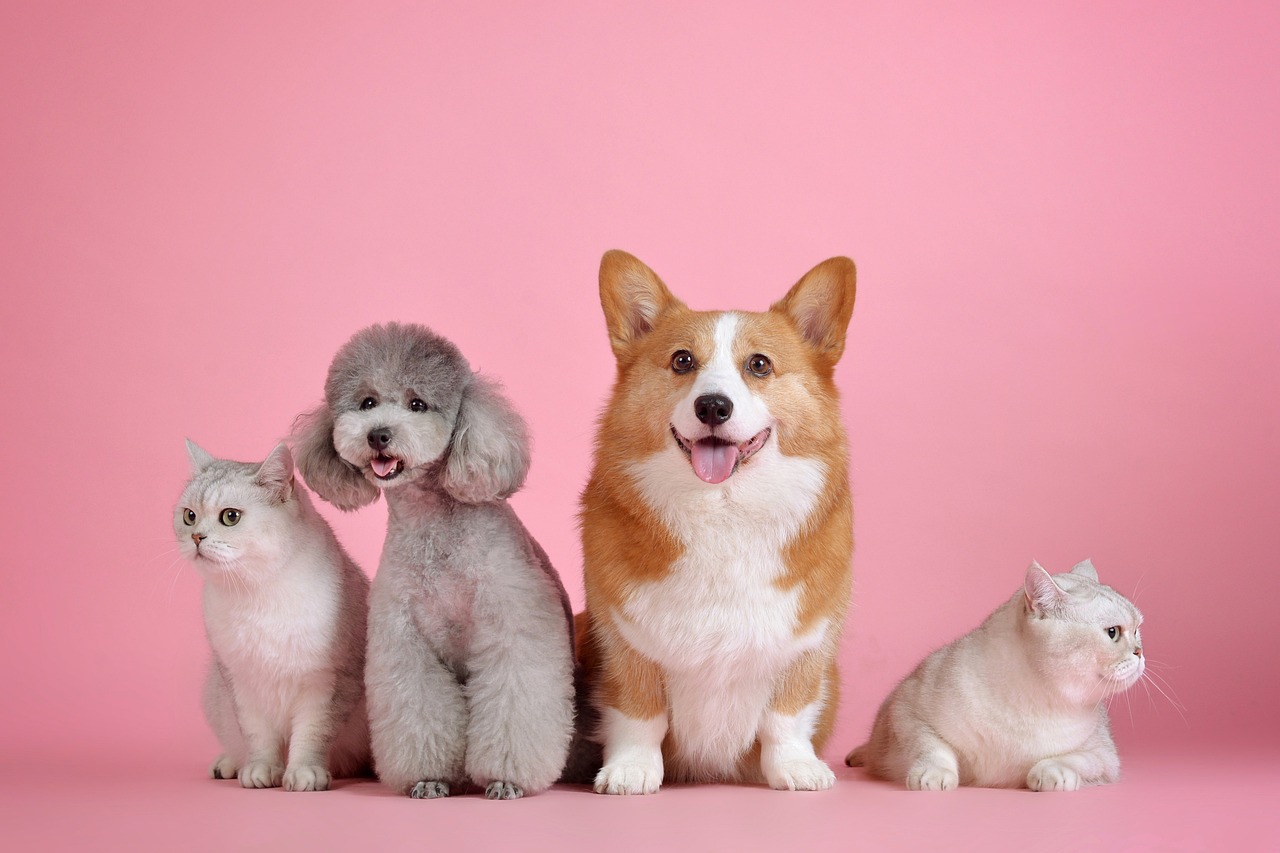
The Link Between Diet and Behavior
Have you ever noticed how your furry friend’s mood seems to shift after a meal? It’s not just your imagination! The connection between diet and behavior in pets is a fascinating area of study that reveals how what we feed our animals can have profound effects on their temperament and overall well-being. Just like humans, pets can experience mood swings, anxiety, and even behavioral issues based on their nutritional intake. So, let’s dive deeper into this intriguing relationship.
Research shows that certain diets can lead to significant improvements in a pet's behavior. For instance, a diet rich in high-quality proteins can enhance energy levels and promote a more playful demeanor. Conversely, a diet high in fillers and low-quality ingredients can lead to lethargy and irritability. Imagine feeding your dog a gourmet meal versus a fast-food burger; the difference in energy and mood is palpable! This principle applies to cats, too, as their behavior can drastically change based on their dietary choices.
One of the most significant findings in the realm of pet nutrition is the impact of specific nutrients on mood regulation. For example, omega-3 fatty acids are known for their anti-inflammatory properties and their ability to promote a calm demeanor. When pets consume adequate amounts of these essential fats, they often exhibit reduced anxiety and aggression. On the other hand, deficiencies in key vitamins, such as the B vitamins, can lead to irritability and mood swings. A well-balanced diet can be the difference between a happy, well-adjusted pet and one that is anxious or aggressive.
But how do we know if our pets are getting the right nutrition? It’s essential to observe their behavior closely. If you notice signs of stress, aggression, or lethargy, it might be time to reassess their diet. Common indicators that a pet may be struggling with nutritional deficiencies include:
- Excessive barking or meowing
- Destructive behavior
- Withdrawal or lack of interest in play
- Changes in appetite
These behaviors can often be traced back to what’s in their food bowl. Therefore, understanding the link between diet and behavior is crucial for pet owners aiming to foster a happy and healthy environment for their furry companions. By making informed dietary choices, you can help your pet not only feel better physically but also behave better emotionally.
In conclusion, the relationship between diet and behavior in pets is a dynamic one. As responsible pet owners, it's our duty to ensure that our pets receive balanced nutrition tailored to their specific needs. By doing so, we can help them lead happier, healthier lives, free from unnecessary behavioral issues. After all, a well-fed pet is often a well-behaved pet!
Q: Can changing my pet's diet really improve their behavior?
A: Yes! A balanced diet rich in essential nutrients can lead to better mood regulation and overall behavior in pets.
Q: What signs should I look for to determine if my pet's diet is affecting their behavior?
A: Look for changes in energy levels, mood swings, aggression, or withdrawal from activities. These can all be indicators of dietary deficiencies.
Q: Should I consult a veterinarian before changing my pet's diet?
A: Absolutely! A veterinarian can help you determine the best dietary plan tailored to your pet's specific needs and health conditions.
Common Nutritional Deficiencies
When it comes to our furry friends, understanding nutritional deficiencies is crucial for maintaining their overall health and happiness. Just like humans, pets can suffer from a lack of essential nutrients, which can lead to a variety of behavioral issues. For instance, if your pet seems more irritable or anxious than usual, their diet might be to blame. Nutritional deficiencies can manifest in subtle ways, affecting not just physical health but also emotional well-being. So, what are the most common deficiencies that pet owners should be aware of?
One of the most significant culprits is a lack of omega-3 fatty acids. These essential fats play a vital role in promoting a calm demeanor and can help reduce aggressive behaviors. Pets that are deficient in omega-3s might exhibit signs of anxiety or hyperactivity, making it crucial to include sources like fish oil or flaxseed in their diet. Additionally, many pet owners overlook the importance of B vitamins. These vitamins are essential for energy levels and mood stability. A deficiency here can lead to lethargy and irritability, leaving your pet feeling less than their best.
Other common deficiencies include vitamin D, which is essential for bone health and can influence mood, and iron, which is crucial for maintaining energy levels. If your pet is low in iron, they may seem tired and less playful. It’s important to recognize the signs of these deficiencies early on. Some indicators might include:
- Changes in appetite
- Unusual aggression or anxiety
- Lethargy or decreased playfulness
- Skin issues or poor coat condition
By keeping an eye out for these signs, you can take proactive steps to address any nutritional gaps in your pet's diet. Regular vet check-ups can also help in identifying these deficiencies before they escalate into more serious behavioral problems.
In conclusion, understanding and addressing common nutritional deficiencies is a key component of ensuring your pet's well-being. A well-balanced diet not only supports physical health but also contributes to a happier, more stable pet. So, the next time you’re considering your pet’s diet, remember: what they eat can significantly impact how they feel and behave.
Q: How can I tell if my pet has a nutritional deficiency?
A: Look for changes in behavior, appetite, and energy levels. If you notice lethargy, irritability, or changes in coat condition, it may be time for a dietary review.
Q: What are the best sources of omega-3 fatty acids for pets?
A: Fish oil and flaxseed are excellent sources. You can also find pet foods that are fortified with omega-3s.
Q: Should I consult a vet before changing my pet's diet?
A: Yes, it’s always a good idea to consult with a veterinarian to ensure that any dietary changes meet your pet’s specific health needs.
Effects of Omega-3 Fatty Acids
When it comes to our furry friends, nutrition is key to their overall health and behavior. One of the most fascinating nutrients that has gained attention in recent years is omega-3 fatty acids. These essential fats, often found in fish oils and certain plant oils, play a crucial role in maintaining not just physical health but also emotional well-being. Imagine omega-3s as the soothing balm for your pet's mind—helping to calm their nerves and promote a more balanced demeanor.
Research has shown that omega-3 fatty acids can significantly impact behavior in pets. For instance, they are known to reduce anxiety and aggression, which can lead to a happier and more stable pet. This is particularly important for dogs and cats facing stressful situations, such as loud noises, changes in their environment, or even during training. By incorporating omega-3s into their diet, pet owners can help their companions cope better with these stressors.
But how exactly do omega-3 fatty acids work their magic? They contribute to the production of neurotransmitters, which are the brain's chemical messengers. A well-balanced diet rich in omega-3s can enhance the communication between these neurotransmitters, leading to improved mood and behavior. Think of it as tuning a musical instrument; when everything is in harmony, the result is a beautiful symphony, or in this case, a well-adjusted pet.
So, what are some of the best sources of omega-3 fatty acids for pets? Here are a few options:
- Fish oil: Rich in EPA and DHA, the most beneficial types of omega-3s.
- Flaxseed oil: A great plant-based source for pets, especially for those with fish allergies.
- Chia seeds: These tiny seeds pack a nutritional punch and can be easily added to meals.
- Walnuts: Another plant source, although moderation is key due to high fat content.
Incorporating these sources into your pet's diet doesn't have to be complicated. Many commercial pet foods now include omega-3 fatty acids, but it's essential to read the labels carefully. Look for products that specifically mention the inclusion of fish oil or flaxseed oil. If you're considering supplements, always consult with your veterinarian to determine the right dosage and form for your pet.
In conclusion, omega-3 fatty acids are not just another health fad; they are a vital component of a balanced diet that can lead to improved behavior and emotional stability in pets. By ensuring that your furry friend gets enough of these essential fats, you are investing in their happiness and well-being. Remember, a calm pet is a happy pet!
Q: How can I tell if my pet is getting enough omega-3 fatty acids?
A: Signs of deficiency may include dry skin, excessive shedding, and behavioral issues like anxiety or aggression. If you notice these signs, it might be time to reassess their diet.
Q: Can I give my pet human fish oil supplements?
A: While some human supplements can be safe for pets, it's crucial to consult with your veterinarian first. They can recommend the appropriate dosage and form for your specific pet.
Q: Are there any side effects of omega-3 supplements?
A: In general, omega-3 fatty acids are safe, but excessive amounts can lead to gastrointestinal upset or increased bleeding risk. Always follow veterinary guidance.
Importance of B Vitamins
B vitamins play a crucial role in maintaining the overall health and well-being of our pets. These vitamins are essential for various bodily functions, including energy production, metabolism, and the maintenance of a healthy nervous system. When it comes to our furry companions, the right balance of B vitamins can significantly influence their mood and behavior. For instance, deficiencies in these vitamins can lead to lethargy, irritability, and anxiety, which can manifest in undesirable behavior.
There are several types of B vitamins, each contributing uniquely to your pet's health. Here’s a quick overview of some key B vitamins and their roles:
| B Vitamin | Role in Pet Health | Sources |
|---|---|---|
| B1 (Thiamine) | Supports energy metabolism and nerve function. | Whole grains, meat, fish. |
| B2 (Riboflavin) | Important for energy production and skin health. | Eggs, dairy products, leafy greens. |
| B3 (Niacin) | Helps in the formation of DNA and metabolism of fats. | Meat, fish, whole grains. |
| B6 (Pyridoxine) | Crucial for protein metabolism and cognitive function. | Poultry, fish, potatoes. |
| B12 (Cobalamin) | Essential for red blood cell formation and neurological function. | Meat, dairy, eggs. |
As you can see, each B vitamin serves a specific purpose, and a deficiency in any of these can lead to a ripple effect on your pet's behavior. For example, a lack of B6 can lead to increased irritability and anxiety, while insufficient B12 may contribute to lethargy and cognitive decline. Thus, ensuring your pet receives a balanced diet rich in these vitamins is essential for maintaining their energy levels and emotional stability.
When choosing pet food, look for products that list whole food sources of B vitamins in the ingredients. Additionally, consider incorporating natural foods such as lean meats, eggs, and green vegetables into their diet. These not only provide B vitamins but also contribute to a well-rounded nutritional profile that supports overall health and positive behavior.
In conclusion, B vitamins are not just a supplement; they are a fundamental part of your pet's diet that can help shape their behavior and emotional well-being. By prioritizing these essential nutrients, you can enhance your pet's quality of life and ensure they remain happy and healthy.
- What are the symptoms of B vitamin deficiency in pets? Symptoms can include lethargy, irritability, poor coat condition, and even behavioral changes such as increased anxiety or aggression.
- How can I ensure my pet gets enough B vitamins? Provide a balanced diet that includes high-quality pet food and consider adding natural sources like meat, fish, and vegetables.
- Are B vitamin supplements necessary for all pets? Not necessarily; a well-balanced diet typically provides sufficient B vitamins, but consult your veterinarian for specific recommendations based on your pet's needs.
Choosing the Right Pet Food
When it comes to our furry friends, choosing the right pet food is akin to picking the best ingredients for a gourmet meal. Just like we feel more energetic and happy when we eat nutritious food, our pets thrive on a balanced diet that nourishes their bodies and minds. But with so many options available, how do we sift through the noise and find what truly works for our pets?
First and foremost, it’s essential to understand that not all pet foods are created equal. The quality of ingredients plays a significant role in your pet's overall health and behavior. When selecting a pet food, always look for high-quality protein sources as the first ingredient. This could be chicken, beef, or fish, which are vital for muscle development and energy. Remember, if the first ingredient is a vague term like "meat by-products," it might be a red flag.
Another critical aspect to consider is the balance of nutrients in the food. A well-rounded diet should include:
- Proteins: Essential for growth and repair.
- Fats: Provide energy and support cell structure.
- Carbohydrates: Serve as a quick energy source.
- Vitamins and Minerals: Crucial for various bodily functions and overall well-being.
Reading labels is not just a chore; it’s a vital step in ensuring your pet gets the nutrition they need. Look for pet foods that have undergone feeding trials or are backed by veterinary nutritionists. This indicates that the food has been tested for its effectiveness and safety. Also, keep an eye out for any artificial additives, preservatives, or fillers. While they might make the food look more appealing, they can be detrimental to your pet's health in the long run.
It’s also worth noting that your pet's age, breed, and health conditions should influence your food choice. For instance, a growing puppy will have different nutritional needs than a senior dog. Similarly, some breeds may be more prone to specific health issues, necessitating a tailored diet. Consulting your veterinarian can be invaluable in this regard, as they can provide personalized recommendations based on your pet's unique needs.
Lastly, don’t forget about the importance of hydration. Fresh water should always be available, as it plays a crucial role in your pet's digestion and overall health. A well-hydrated pet is a happy pet!
In conclusion, choosing the right pet food is a combination of understanding your pet's specific needs, reading labels carefully, and opting for high-quality ingredients. By taking the time to make informed choices, you’re not just feeding your pet; you’re investing in their happiness and well-being.
1. How do I know if the pet food is of good quality?
Look for high-quality protein as the first ingredient, avoid artificial additives, and check if the food has undergone feeding trials.
2. Should I consult a vet before changing my pet's diet?
Absolutely! A veterinarian can provide tailored advice based on your pet’s specific needs and health conditions.
3. Can I feed my pet homemade food instead of commercial pet food?
Yes, but it’s crucial to ensure that homemade meals are balanced and meet all nutritional requirements. Consulting a vet or a pet nutritionist is advisable.

Special Dietary Needs
When it comes to our beloved pets, one size definitely does not fit all, especially when it comes to their dietary needs. Just like humans, pets have unique nutritional requirements based on a variety of factors such as their age, breed, and any specific health conditions they may have. Understanding these special dietary needs is crucial for pet owners who want to ensure their furry friends are happy, healthy, and well-behaved.
For instance, puppies and kittens have different nutritional requirements than adult or senior pets. They need a diet rich in proteins and calories to support their rapid growth and development. Feeding them a balanced diet during this critical stage can set the foundation for their future health and behavior. If you think of it like building a house, the early years of your pet's life are like pouring the concrete foundation—get it right, and everything else will follow smoothly!
On the other hand, senior pets often require a different approach. As pets age, their metabolism slows down, and they may become less active. This change can lead to weight gain if their diet isn't adjusted accordingly. Additionally, senior pets may develop health issues such as arthritis or kidney disease, which can also influence their dietary needs. For example, a senior dog might benefit from a diet lower in protein but higher in specific nutrients that support joint health. It's like switching from a high-octane fuel to something more suitable for a classic car—keeping it running smoothly without overwhelming it.
Moreover, pets with certain health conditions, such as allergies or diabetes, require specialized diets. For instance, a dog with food allergies may need to avoid common allergens like grains or specific proteins. In such cases, consulting with a veterinarian is essential to create a tailored nutrition plan that addresses these specific needs. Here’s a quick summary of some common special dietary needs:
| Pet Type | Special Dietary Needs |
|---|---|
| Puppies | High protein and calorie content for growth |
| Adult Dogs | Balanced diet based on activity level |
| Senior Pets | Lower calories, joint support, and specific nutrients |
| Pets with Allergies | Grain-free or hypoallergenic diets |
| Diabetic Pets | Low carbohydrate, high fiber diets |
In conclusion, being attentive to your pet's special dietary needs is not just about keeping them full; it's about enhancing their overall quality of life and ensuring they have the best chance at a long, healthy, and happy existence. So, whether you’re feeding a sprightly puppy or a wise old cat, remember that their diet is a vital part of their behavioral health and emotional well-being.
- What are the signs that my pet might need a special diet? Look for changes in behavior, weight fluctuations, or signs of allergies.
- How can I find the right food for my aging pet? Consult your veterinarian to help tailor a diet that meets their specific health needs.
- Are homemade diets suitable for pets with special needs? While they can be, it’s crucial to ensure they are balanced and meet nutritional requirements, which is best done under veterinary guidance.
Dietary Considerations for Puppies and Kittens
When it comes to the little furballs we adore, puppies and kittens have unique nutritional needs that are crucial for their growth and development. Think of it like laying the foundation for a house; if the base is weak, everything built on top will be unstable. The first few months of a pet's life are a whirlwind of growth, energy, and exploration, and proper nutrition plays a vital role in shaping their future behavior and health.
During this formative stage, puppies and kittens require a diet rich in calories, proteins, and essential nutrients. These elements not only fuel their playful antics but also support the development of their bones, muscles, and immune systems. For instance, a high-quality puppy or kitten food will often have a higher protein content compared to adult formulas, as these young animals are in a phase of rapid growth. In fact, the right balance of nutrients can help prevent behavioral issues that stem from discomfort or health problems.
It’s important to keep an eye on the specific dietary needs of your new pet. For puppies, a diet that includes DHA (docosahexaenoic acid) is essential for brain development, while for kittens, taurine is a must-have for heart and eye health. These nutrients not only contribute to physical well-being but also play a role in mood regulation. A well-fed puppy or kitten is more likely to be energetic and playful rather than irritable or anxious.
Another key consideration is the feeding schedule. Puppies typically need to eat three to four times a day until they are about six months old, while kittens may require similar frequent meals. This regular feeding routine helps stabilize their energy levels and promotes a happy, well-adjusted pet. Just like humans, pets thrive on routine. A consistent schedule can also help with house training, making the process smoother for both pet and owner.
When selecting food, always opt for products that are labeled as “complete and balanced” for puppies or kittens. This ensures that they are getting all the essential nutrients they need. Don’t be shy about consulting your veterinarian for recommendations on the best food for your specific breed and lifestyle. Remember, not all pet foods are created equal; some may contain fillers or low-quality ingredients that can impact your pet's health and behavior.
As your puppy or kitten grows, their dietary needs will change. Transitioning to adult food should happen gradually, typically around one year for dogs and around nine months for cats. This gradual shift is important to prevent digestive upset and ensure that their nutritional needs continue to be met. Always monitor your pet’s weight and behavior during this transition to make sure they are adapting well.
In summary, ensuring that your puppy or kitten receives a balanced diet tailored to their age and developmental stage is essential for their health and behavior. By focusing on high-quality ingredients, maintaining a consistent feeding schedule, and being aware of their changing needs, you can help your furry friend grow into a healthy, happy adult pet.
- What should I feed my puppy or kitten?
Choose a high-quality, age-appropriate food labeled as "complete and balanced." - How often should I feed my young pet?
Puppies should be fed 3-4 times a day, while kittens usually require similar frequent meals. - When should I transition my pet to adult food?
Typically around one year for dogs and around nine months for cats, but consult your vet for specifics. - Can I give my puppy or kitten treats?
Yes, but ensure they are appropriate for their age and do not exceed 10% of their daily caloric intake.
Nutrition for Senior Pets
As our beloved pets age, their nutritional needs shift significantly, much like how our own dietary requirements change as we grow older. Senior pets often face a variety of health challenges, including decreased metabolism, joint issues, and cognitive decline, which can all influence their behavior. Therefore, it is crucial to adjust their diets to support their changing bodies and minds. A diet tailored for senior pets should focus on maintaining their health while also promoting a calm demeanor and overall well-being.
One of the primary considerations for senior pet nutrition is the reduction of calories. Older pets are generally less active, which means they require fewer calories to maintain a healthy weight. However, this doesn’t mean skimping on essential nutrients. In fact, senior diets should be rich in high-quality proteins to help maintain muscle mass, which can diminish with age. Additionally, incorporating omega-3 fatty acids can help combat inflammation and support joint health, making it easier for older pets to move comfortably.
Another critical aspect of senior pet nutrition is the inclusion of fiber. As pets age, their digestive systems can slow down, leading to issues such as constipation. A diet high in fiber can aid digestion and promote regular bowel movements. Furthermore, senior pets may benefit from added vitamins and minerals, particularly antioxidants like vitamin E and beta-carotene, which can help bolster their immune systems and protect against age-related diseases.
Moreover, hydration becomes increasingly important as pets age. Senior pets may not drink as much water as they should, leading to dehydration, which can exacerbate health issues. To encourage hydration, consider incorporating wet food into their diet or adding water or broth to their dry food. This not only helps keep them hydrated but can also make mealtime more enjoyable and appetizing.
It’s essential to monitor your senior pet's weight and adjust their food intake accordingly. Regular vet check-ups can help you stay on top of any health changes and ensure that their diet is meeting their specific needs. Additionally, consider the following dietary adjustments:
- Choose a high-quality senior pet food that meets the AAFCO standards.
- Look for foods that list real meat as the first ingredient.
- Ensure the food contains joint-supporting ingredients, such as glucosamine and chondroitin.
- Consult your veterinarian about any specific dietary supplements that may benefit your pet.
In conclusion, proper nutrition for senior pets is not just about feeding them; it’s about enriching their lives and enhancing their quality of life. By understanding their unique dietary needs and making informed choices, you can help your furry friend age gracefully and maintain a happy, healthy demeanor well into their golden years.
1. What should I look for in senior pet food?
When choosing food for senior pets, look for high-quality ingredients, specifically formulated for older animals. Ensure it contains adequate protein, fiber, and essential fatty acids, along with vitamins and minerals that support overall health.
2. How can I tell if my senior pet is overweight?
You can check if your pet is overweight by feeling their ribs. You should be able to feel them without excess fat covering. Additionally, look for a noticeable waist when viewed from above.
3. Is wet food better for senior pets?
Wet food can be beneficial for senior pets as it helps with hydration and can be easier to chew and digest. However, it’s essential to ensure that it meets all their nutritional needs.
4. Should I consult a vet before changing my senior pet’s diet?
Absolutely! Consulting your veterinarian is crucial before making any significant dietary changes, as they can provide personalized advice based on your pet’s health status.

Practical Tips for Pet Owners
When it comes to ensuring your furry friends are happy and well-behaved, nutrition plays a crucial role. It's not just about filling their bowls with food; it's about providing them with the right kind of fuel to thrive. Here are some practical tips that can help you optimize your pet's diet and, in turn, their behavior. First and foremost, always choose high-quality pet food. Look for brands that list real meat as the first ingredient and avoid those that contain fillers like corn and soy. Reading labels may feel tedious, but it’s essential for your pet's health. Remember, you wouldn’t want to eat junk food every day, right? Neither does your pet!
Next, consider meal planning. Just like we benefit from a balanced diet, pets do too! Create a weekly meal plan that incorporates a variety of proteins, vegetables, and grains suitable for your pet's specific needs. This not only keeps their meals interesting but also ensures they are getting a range of nutrients. If you’re unsure about what to include, consult with your veterinarian. They can provide personalized recommendations based on your pet’s age, breed, and health conditions.
Don't forget about treats; they can be a great way to reinforce positive behavior. However, treats should complement their diet, not replace it. Opt for healthy options like small pieces of fruits or vegetables, or even specially formulated pet treats that are low in calories. It's all about moderation! You might be surprised at how a few healthy snacks can improve your pet’s mood and behavior.
Another tip is to pay attention to your pet's hydration. Fresh water should always be available, as hydration is key to overall health. Sometimes, pets can be picky about drinking water, so consider adding a splash of low-sodium broth to their water bowl to entice them. You can also explore the option of wet food, which can help increase their water intake while providing additional nutrients.
Lastly, don't hesitate to seek professional guidance. If you notice any behavioral changes in your pet, it could be a sign of nutritional deficiencies. A vet or a pet nutritionist can help you assess your pet's diet and make necessary adjustments. They can also help you navigate any special dietary needs your pet may have, ensuring they get the best nutrition possible.
Q: How can I tell if my pet is getting the right nutrition?
A: Look for signs like a shiny coat, healthy skin, and good energy levels. If you notice changes in behavior, appetite, or weight, consult your vet.
Q: Are homemade diets better for pets?
A: Homemade diets can be beneficial but must be balanced and complete. It's best to work with a veterinarian to ensure your homemade meals meet all nutritional requirements.
Q: How often should I feed my pet?
A: This depends on your pet's age, size, and activity level. Puppies and kittens typically require more frequent feedings than adults. Consult your vet for a tailored feeding schedule.
Q: Can treats affect my pet's behavior?
A: Yes! Treats can be a great tool for training and rewarding good behavior, but overindulgence can lead to weight gain and behavioral issues. Choose healthy options and use them sparingly.
Frequently Asked Questions
- How does nutrition affect my pet's behavior?
Nutrition plays a vital role in influencing your pet's behavior. Just like humans, pets can experience mood swings, anxiety, and even aggression based on what they eat. A balanced diet rich in essential nutrients can lead to improved temperament and overall well-being. For instance, diets high in omega-3 fatty acids have been linked to calmer behavior in pets.
- What are the essential nutrients my pet needs?
Your furry friend requires a variety of nutrients to thrive, including proteins, fats, carbohydrates, vitamins, and minerals. Each of these components contributes to their physical health and behavioral stability. For example, B vitamins are crucial for energy levels and mood regulation, while proteins are essential for muscle development and repair.
- What are the signs of nutritional deficiencies in pets?
Common signs of nutritional deficiencies include changes in behavior such as increased aggression, lethargy, or anxiety. If you notice your pet becoming more irritable or less active, it might be time to reassess their diet. Look out for physical signs too, like dull fur or weight changes, as these can indicate underlying nutritional issues.
- How can I choose the right pet food?
Choosing the right pet food involves reading labels carefully and understanding ingredient lists. Look for high-quality sources of protein, healthy fats, and essential vitamins and minerals. Avoid foods with fillers or artificial additives. Consulting with a veterinarian can also guide you in selecting the best diet for your pet's unique needs.
- Do puppies and kittens have different nutritional needs?
Absolutely! Puppies and kittens have specific dietary requirements that support their rapid growth and development. A balanced diet during these early stages is crucial as it lays the foundation for their future health and behavior. Ensure they receive the right mix of proteins, fats, and vitamins tailored to their age.
- What dietary considerations should I keep in mind for senior pets?
As pets age, their nutritional needs change. Senior pets may require diets lower in calories but higher in fiber to manage weight and promote digestive health. Additionally, incorporating nutrients that support cognitive function and joint health can help alleviate behavioral issues associated with aging, such as anxiety and confusion.
- Can I give my pet treats without affecting their diet?
Yes, but moderation is key! Treats can be a great way to bond with your pet, but they should not exceed 10% of their daily caloric intake. Opt for healthy, nutritious treats that complement their diet rather than detract from it. Always check the ingredients to ensure they align with your pet's nutritional needs.
- When should I seek professional guidance for my pet's diet?
If you're unsure about your pet's dietary needs or notice behavioral changes that concern you, it's best to consult with a veterinarian or a pet nutritionist. They can provide personalized advice based on your pet's age, breed, health conditions, and lifestyle, ensuring you make informed choices for their well-being.




